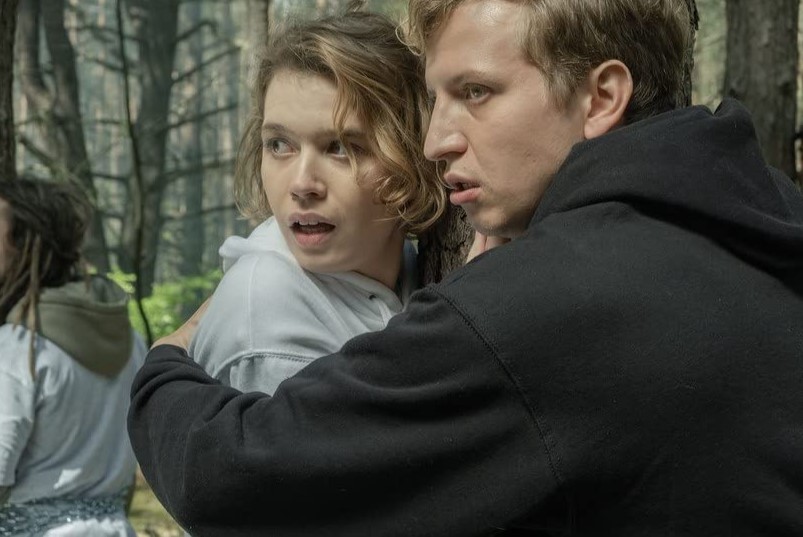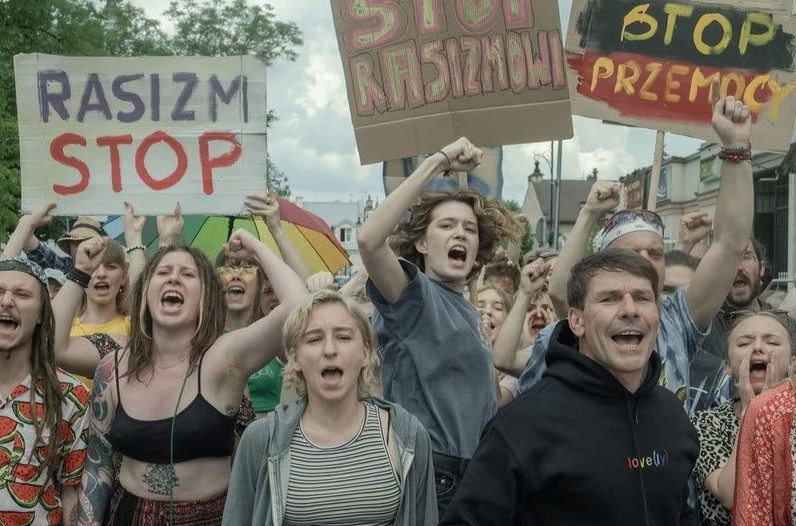Directed by Piotr Kumik, ‘Operation: Nation’ or ‘Kryptonim: Polska’ is a Polish romantic comedy-drama film. The plot revolves around Staszek Sulkowski (Maciej Musialowski) and Pola Ratajczyk (Magdalena Mascianica), who seem to be on opposite ends of the political spectrum. After the abrupt end of his dreams to become a soccer player due to an injury, Staszek has been largely directionless in life and begins spending time with his Nationalist cousin, Roman (Borys Szyc), and his lackeys in the Radical Youth Association (ZMR) or RYS. Meanwhile, Pola is a hardcore liberal who moves to Białystok after discovering her boyfriend with another woman. The two meet and there is an immediate connection.
Realizing her political affiliation, Staszek hides the fact that he is somewhat of a member of a far-right group. But concealing the truth becomes increasingly difficult when Pola begins doing her M.A. thesis on ZMR, and Roman plans to blow up an explosive during a Pride rally. ‘Operation: Nation’ is an earnest satire on the rising Nationalist and fascist movements in Europe. If that has made you wonder whether the film is based on true events, we got you covered.
Operation Nation is a Fictional Story
No, ‘Operation: Nation’ is not based on a true story, though aspects of reality are embedded in the narrative. Kumik developed the film from a script by Jakub Ruzyllo and Lukasz Sychowicz. Beyond the messages about society, politics, and the resurgence of fascism, ‘Operation: Nation’ is also a love story between two people representing opposing ideas. In this matter, it draws inspiration from English playwright William Shakespeare’s ‘Romeo and Juliet.’

While ZMR is a fictional Nationalist group, the commentary the film makes on the rise of the Nationalists in Polish politics is very real. The current ruling party in Poland is Law and Justice or Prawo i Sprawiedliwość, a right-wing populist and national-conservative political party established in 2001. Białystok, where most of the film is set, is a city located in northeastern Poland and the capital of the Podlaskie Voivodeship.
Following the re-emergence of the far-right movement in national politics, the city has witnessed several incidents involving people adhering to that particular political ideology. In July 2019, the first-ever equality parade in Białystok encountered hundreds of protesters, reportedly shouting homophobic slogans and hurling firecrackers, rocks, and bottles. The local police intervened, apprehending 77 people. In September 2020, the Nationalists and right-wing activists organized the ‘March of Normality‘ in Bialystok.
Moreover, certain scenes in the film seem to have been directly inspired by various real-life incidents. The film begins with the ZMR hosting Hitler’s birthday party. Although the police arrest the attendees, including Roman, they are later acquitted. In January 2018, TVN station put out a report in which they chronicled Polish neo-Nazis attending a party celebrating Hitler’s birthday in May 2017 in the forest near Wodzisław Śląski. However, the Conservative news website wpolityce.pl later published a report claiming the party was a staged event. Ultimately, those who were accused got suspended prison sentences.
The scene in which Mieszko gets stabbed and the subsequent protests are likely inspired by a series of incidents that happened in late 2016 and early 2017 in the Polish city of Ełk. On December 31, 2016, a man named Daniel Rudnicki and his colleague began misbehaving at the Prince Kebab shop, leading to a fight with them on one side and the restaurant owner and his employees on the other. The cook, a Tunisian immigrant with Polish citizenship, had a knife with him. Following the lethal encounter, Rudnicki died, and that, in turn, led to a riot the following day, committed by dozens of locals. It was reported that right-wing political organizations were involved in that.

The climactic scene in which Roman and his gang try to bomb a pride march was also inspired by real events. In 2020, Karolina S. and Arkadiusz S. were both sentenced to one year in prison after they brought homemade explosive material to the Equality March in Lublin, a city in Southwestern Poland, the previous year. So, to sum it all up, the story of ‘Operation: Nation’ is fictional, but the narrative considerably draws from reality.


You must be logged in to post a comment.